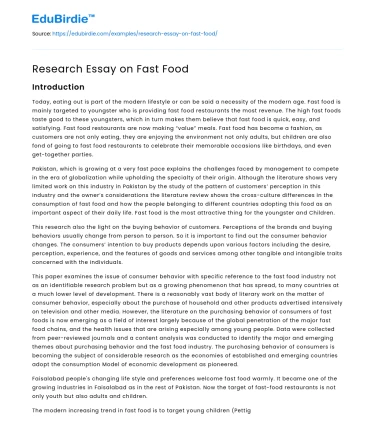Introduction
The proliferation of fast food establishments over the past few decades has significantly reshaped dietary habits and cultural norms across the globe. Originating in the United States in the early 20th century, fast food has grown into a multibillion-dollar industry, influencing not only culinary trends but also public health, economic dynamics, and social behaviors. While fast food offers convenience and affordability, it is often criticized for its nutritional deficiencies and its role in the obesity epidemic. This essay explores the multifaceted impact of fast food on society, examining its advantages and disadvantages, and addressing the controversies it incites. By analyzing both the benefits and drawbacks of fast food, this essay aims to provide a balanced perspective on an industry that is both celebrated and vilified.
Economic Influence of the Fast Food Industry
The fast food industry represents a significant economic force, providing employment to millions and contributing substantially to national economies. According to the National Restaurant Association, the fast food industry in the United States employs over 4 million people, making it a crucial sector in the labor market. Fast food chains like McDonald's, Subway, and KFC have established global presences, generating substantial revenues and creating vast supply chains that support agricultural and manufacturing sectors. The affordability and accessibility of fast food make it a popular choice for consumers, particularly in urban areas where time constraints and lifestyle demands prioritize convenience.
Save your time!
We can take care of your essay
- Proper editing and formatting
- Free revision, title page, and bibliography
- Flexible prices and money-back guarantee
However, the economic benefits of fast food are accompanied by several criticisms. The industry is often associated with low wages and precarious employment conditions. A study by the Economic Policy Institute highlights that fast food workers earn significantly less than the average wage across other sectors, often lacking essential benefits like health insurance and paid leave. Furthermore, the industry's reliance on low-cost ingredients has led to concerns about sustainable practices and environmental impacts. Critics argue that the pursuit of profit often overrides considerations for worker rights and environmental stewardship, prompting calls for reform in labor policies and supply chain management.
Despite these criticisms, proponents argue that fast food offers essential opportunities for entry-level employment, providing a stepping stone for individuals entering the workforce. Fast food chains also contribute to local economies through franchise models, enabling entrepreneurship and generating tax revenues. The challenge lies in balancing economic growth with ethical and sustainable practices, ensuring that the industry’s expansion benefits all stakeholders.
Health Implications of Fast Food Consumption
The health consequences of fast food consumption are a major concern among nutritionists and public health experts. Fast food is often characterized by high levels of calories, saturated fats, sugar, and sodium, contributing to the global rise in obesity and related health issues such as diabetes, heart disease, and hypertension. A study published in the "Journal of the American College of Cardiology" found that regular consumption of fast food significantly increases the risk of developing cardiovascular diseases.
Despite these alarming findings, the fast food industry has made strides in offering healthier options. Many chains now provide salads, fruits, and low-calorie meal alternatives in response to growing consumer demand for healthier choices. The introduction of calorie labeling on menus in some regions has also empowered consumers to make more informed dietary decisions. However, the effectiveness of these measures remains debated. Some argue that merely offering healthier options does not address the core issue of fast food’s nutritional quality; instead, it requires a more comprehensive approach to food education and public health policy.
Critics also point out that fast food marketing strategies often target children and adolescents, promoting unhealthy eating habits from a young age. The aggressive marketing of fast food through digital platforms and social media has been linked to increased consumption among youth, exacerbating public health challenges. As such, there is a growing call for stricter regulations on fast food advertising, particularly those aimed at younger audiences.
Social and Cultural Impact of Fast Food
Fast food has left an indelible mark on social and cultural landscapes worldwide. Its convenience and affordability have made it a staple in busy lifestyles, particularly in urban settings where time is precious. The cultural penetration of fast food is evident in the way it has adapted to local tastes and customs, creating unique menu items tailored to regional preferences. For instance, McDonald's offers a McAloo Tikki burger in India to cater to local vegetarian preferences, demonstrating the industry’s adaptability and cultural sensitivity.
Yet, fast food is often criticized for contributing to the homogenization of global diets, leading to a loss of traditional culinary practices and a decline in regional food diversity. Critics argue that the dominance of fast food chains in the market marginalizes local food businesses and erodes cultural heritage. This has sparked movements advocating for the preservation of traditional cuisines and the promotion of sustainable, locally sourced food.
Moreover, fast food has become a symbol of globalization, representing Western influences in diverse cultural contexts. This has sparked debates about cultural imperialism and the implications of Western dietary habits on local societies. While some view the spread of fast food as a form of cultural exchange, others perceive it as a threat to cultural identity and culinary traditions.
Conclusion
The fast food industry occupies a complex position in modern society, offering economic benefits and convenience while posing significant health and cultural challenges. Its influence extends beyond mere dietary habits, impacting employment, public health, and cultural identities. As the industry continues to evolve, it faces the dual challenge of addressing the criticisms leveled against it while maintaining its market appeal. This requires a concerted effort from policymakers, industry leaders, and consumers to promote ethical practices, enhance nutritional quality, and preserve cultural diversity. By navigating these challenges, the fast food industry can continue to thrive while contributing positively to society.






 Stuck on your essay?
Stuck on your essay?

